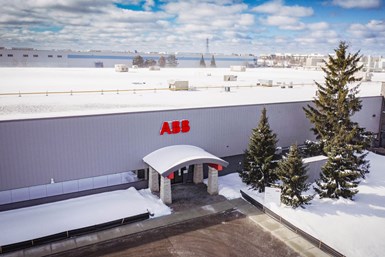ABB Begins Expansion on Michigan Headquarters
The expansion is expected to be completed in November 2023 and will create 72 new skilled jobs in the area.
Share




ABB Inc. has started construction on the expansion of its North American robotics headquarters and manufacturing facility in Auburn Hills, Michigan. The project is expected to be completed in November 2023 and will create 72 new skilled jobs in the area.
Sami Atiya, president of ABB Robotics and Discrete Automation, says, “Our expanded facility will help us to better serve customers in the US and across the Americas, giving them access to innovative automated solutions.”
The latest investment in its robotics headquarters and factory is expected to significantly increase the factory’s production capacity and benefit customers in the Americas, particularly those in electric vehicles, healthcare, packaging and logistics. ABB Robotics moved into the 538,000-square-foot building in 1993 and opened the manufacturing plant in 2015. The expansion and increased use of automation in the factory will create new jobs, supporting the ABB Robotics Packaging and Logistics Headquarters in Atlanta, Georgia and the Robotics Lifesciences and Healthcare Hub located at the Texas Medical Center in Houston Texas. ABB already has a workforce of approximately 350 employees at Auburn Hills, Michigan. ABB’s footprint in the U.S. is more than 20,000 employees, over more than 40 sites nationally.
“The expanded facility will feature the most advanced technology available, with AI-enabled robots and smart digital manufacturing systems supporting the production and manufacture of state-of-the-art customer solutions,” says John Bubnikovich, ABB U.S. robotics division president. “Almost every aspect of the site will be upgraded to enrich our efforts to attract, retain and nurture the best automation talent, while creating a U.S. manufacturing hub and headquarters befitting of a global leader in automation.
This investment will see the latest digital and automation technologies implemented to manufacture next-generation robots in the U.S., streamlining the delivery process and reducing lead times. The plant will use flexible, modular production cells that are digitally connected and networked, and served by intelligent autonomous mobile robots. AI-powered robotic systems will take on tasks such as screw driving, assembling and material handling, relieving people from these tasks and enabling more rewarding work.
Related Content
-
Lean Approach to Automated Machine Tending Delivers Quicker Paths to Success
Almost any shop can automate at least some of its production, even in low-volume, high-mix applications. The key to getting started is finding the simplest solutions that fit your requirements. It helps to work with an automation partner that understands your needs.
-
Which Approach to Automation Fits Your CNC Machine Tool?
Choosing the right automation to pair with a CNC machine tool cell means weighing various factors, as this fabrication business has learned well.
-
Cutting Part Programming Times Through AI
CAM Assist cuts repetition from part programming — early users say it cuts tribal knowledge and could be a useful tool for training new programmers.

























.jpg;maxWidth=300;quality=90)
